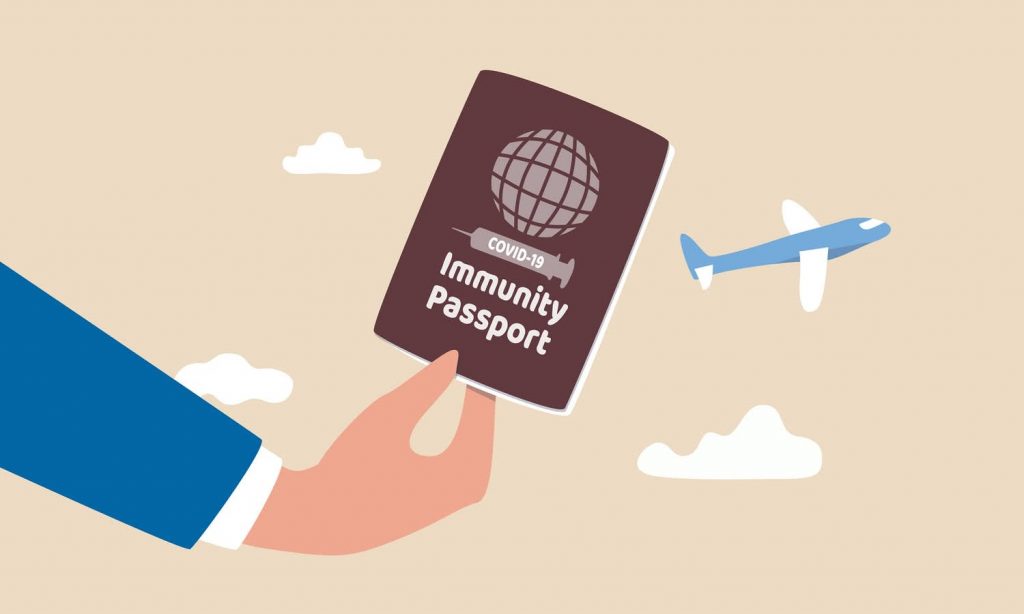Thanks to COVID, we’ve already experienced 18 months of lockdowns where our ability to meet, travel, and work have been heavily restricted. The only path out is through vaccination which has left governments and individuals scrambling to get vaccinated and back to normal.
For the already vaccinated, lockdowns and continuing restrictions are a source of frustration. Governments and businesses around the world are however beginning to put into motion mechanisms to help those with the vaccine move around more freely.
Vaccine passports are on the horizon and, while they are mainly thought of as a necessary precaution, some aren’t so keen. Even if you don’t have a particular issue with a certification for vaccination status, the idea of being ‘coerced’ into getting medical intervention that you might not want can sound alarming.
Still, it looks like vaccine passports will become part of our reality over the coming months and years. Here’s how they might work and the likelihood of them happening here.
What is a vaccine passport?
A vaccine passport is essentially a government-issued document that proves an individual has either had a recent negative COVID-19 test or proof of their vaccination.
While it might sound like a good idea to get us back to travelling and living as normal, privacy concerns are real and critics have said that this creeping intrusion into the private lives of citizens is unwelcome.
The government already knows a lot about us — though anyone who has completed their tax return recently will question how much they really do know — and people simply don’t like the idea of being further monitored by authorities.
The UK has been debating the idea for some time, with new announcements from the UK government suggesting that vaccine passports or negative test certifications will be required for people to enter clubs, bars, and other big events in the UK from September.
Prime Minister Boris Johnson has said “I don’t want to have to close nightclubs again as they have elsewhere. But it does mean nightclubs need to do the socially responsible thing.
“As we said last week, we do reserve the right to mandate certification at any point if it’s necessary to reduce transmission.”
Live music venues have already voiced their concerns over the plans, with Sacha Lord, who runs the famous Warehouse Project club nights, having said that the government “appears to have wiped out live gigs for a whole generation”.
“I am not a scientist or a doctor, but I am deeply concerned by the discriminatory nature for those who either can’t have the vaccine for medical reasons or age, or who do not want to,” he said.
France has gone even further, with Prime Minister Jean Castex effectively telling French citizens that unvaccinated people are the current problem and telling them to stay home.
Of France’s 18,000 new coronavirus cases reported on Tuesday, 96% involved people who were unvaccinated, he said.
From August, a ‘health pass’ will be required for all events or to enter places catering to more than 50 people. That means the unvaccinated will no longer be able to visit restaurants, cafes and shopping centres.
French cinemas, museums, and sports venues have already begun asking visitors for proof of a COVID-19 vaccination or a negative test, prompting over 100,000 French to take to the streets in protest with banners reading “Freedom to choose” and “Hands off my natural immunity!”
Will Australia bring in vaccine passports?
As it stands right now, almost certainly.
The Australian medical system already has the means to identify if someone has had a vaccine or not. Post-vaccine, a person will receive a certificate on their Medicare online account confirming that they have had the vaccine, when they had it, and what type it was.
Here’s mine.

It’s known as a “COVID-19 digital certificate” and makes up part of your immunisation history in your Medicare file.
If you’ve been fully vaccinated, you’ll find your certificate ready and waiting. To find yours, simply head to MyGov, click through to the Medicare portal, and scroll down to find ‘immunisation history’. That page has both your entire Australian immunisation history and a seperate file purely for your COVID-19 jab which you can download.
Most Aussies seem pretty comfortable with the idea, if a little cautious. A recent Guardian Essential poll found that 72% of respondents would support “rules requiring people to prove they are vaccinated before travelling interstate”, while 63% would back a requirement that people prove they are fully vaccinated before entering public venues like restaurants.
Tourism operators have been pressuring the government to provide more clarity on the issue and find a solution that would allow them to operate safely.
Tourism Minister Dan Tehan has already indicated that he wants to give vaccine passport holders the freedom to avoid lockdowns.
“Ultimately, that certificate, initially, could give people the right to be able to travel across borders when there are lockdowns, or if there are parts of a state which have been locked down, because of an outbreak”, he said.
“If you had the double vaccine, then that certificate would enable you to be able to travel and not have to be locked down or not be able to cross borders. And ideally, that’s a situation we’d be able to get to in Australia”.
Prime Minister Scott Morrison has also said that he believes vaccine passports can and should be used in Australia, giving a suggestion at the recent G7 summit that they could be up and running by October.
“We already have vaccine certificates,” Morrison said.
“Later in the year, about October we estimate, we will have a vaccination certificate that will be able to be… internationally recognised to facilitate when people are moving out of the country and into the country.
“Being able to recognise others’ certificates, that is something that has been a common feature of the conversations I have been having with other leaders”.
Recently, the government’s expenditure review committee of cabinet backed a proposal for vaccination certificates. This is part of the government’s multi-million dollar plan to reopen the borders as soon as possible but the Coalition has not yet decided whether the certificates will also be used domestically.
State and federal leaders have been pushing for vaccine passports for some time now despite the assumption that there will be significant opposition from all sides on the issue. With the government intent on getting international borders open as soon as possible, it looks to be a question of ‘how’, not ‘if’, they will be introduced.
How would a vaccine passport work?
Presumably, it will function in a similar way to identification documents currently used to enter bars, clubs, and get on flights.
Federal government plans show that it would involve linking people’s vaccination status on their MyGov accounts with new digital vaccination certificates and border declarations.
There are a number of technical systems being developed currently around the world that could facilitate the use of vaccine passports. Airlines have already begun trialling systems, with software developed by the International Air Transport Association being one of the leading options.
This new ‘Travel Pass’ is a digital health verification app that includes the verification of a passengers COVID-19 vaccination history.
Airlines across the globe have been using the system to allow their customers to prove to authorities that they have recently tested negative as well as their vaccine status.
Qatar Airlines has expanded its trial of this software and is currently using the technology with the cabin crew flying in and out of Doha from Kuwait, London, Los Angeles, New York, Paris and Sydney.
If the trial is successful, it could very well be rolled out across the entire airline industry over the next few months and years.
While people currently don’t take much issue with handing over their drivers’ license to a bouncer to get into a bar, they may well feel different about uploading medical records to their airline as that information is decidedly more sensitive.
However, there are already a number of countries where the submission of vaccine records is a requirement for entry. Colombia, for example, requires that all visitors have a Yellow Fever vaccine before entering the country and must present their certificate of vaccination upon arrival, or a valid waiver form explaining why they might be exempt.
Perhaps it’s just something we’ll need to get used to. After all, passports and drivers licenses are sensitive information too and there was probably a bit of an outcry when it became mandatory to present those. This, however, has now just become a fact of life. Maybe vaccine passports will soon be too.
Read more stories from The Latch and subscribe to our email newsletter.







